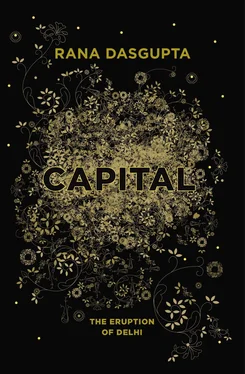“So I finally met Dhruv, the guy I married. I couldn’t point out any real flaws when we met the first time, and his family was not open to us meeting many more times. Because I’m a blabbermouth, I didn’t realise he didn’t talk. He just answered whatever I asked and that was about it, but he really had nothing to say. Mom and Dad wanted me to get married quickly because my sister was going through a rough patch in her marriage, and if something were to happen, I would be less eligible. So things moved quickly. My parents went to see their house and said it was nice. My father visited their factories, which seemed fine, though as we found out later they were not doing well at all.
“Things went badly from the very beginning. We were very different people. I told my husband before we got married, ‘I drink and I smoke and I don’t plan to quit. I understand the family you come from. If you think you have a problem with this, tell me now and we won’t do this. We haven’t got engaged yet, I’m not in love with you and I dare say you’re not in love with me. So we can say what we think.’ ‘No, I’m absolutely cool with that,’ he said. I said, ‘Fine.’
“When we went on our honeymoon, I carried five boxes of smokes. On the way we had a stopover in Singapore. I really wanted to smoke, but he was more into shopping, so I didn’t. So we got to Bali, we checked into the hotel, and the first thing I did was to light a cigarette, go out on the balcony and sit there looking at the view and thinking about this beautiful holiday. And he looked at me and he was quite taken aback; he hadn’t seen me smoking before. He was like, ‘Can’t you put that thing down? Don’t you want to rest a little bit? Don’t you want to lie down and watch TV?’
“I said, ‘I understand that a honeymoon is about lots of sex, but it’s not only about sex. We have to plan out what we’re going to do here because we may never come here again.’ And I’d brought all these pamphlets from the airport, and I wanted him to look through them with me so we could decide what we wanted to do.
“He was very boring. I had to drag him along to scuba diving. The guy didn’t know how to swim and he was nervous about it. So when I realised he was going to take a long time, I jumped in the water and spent a nice twenty minutes, and I came up and he was still sitting on the boat. He said, ‘I’m just about to go.’ Then I went down again and when I came back, he wasn’t there, so I realised he must be under the water. I was tired and I got on the boat, and there was this guy smoking a rolled cigarette and I asked him if he had another one.
“So by the time my husband pops up, I was sitting and smoking, and he saw me and said, ‘Where did you get that cigarette from? You didn’t bring yours with you.’ So I said, ‘No they’re his.’ He was really shocked. He said, ‘But you don’t know him!’ I said, ‘Okay, sorry.’ So I put out my cigarette.
“Actually it was finished anyway. I don’t waste my smokes. Not for anyone in the world.
“I said, ‘Let’s not make an issue of this.’
“Then we went shopping. You know, usually when you go away for the first time as a married couple, you bring back presents for everyone, so I made a list of everyone in his family and mine. He wanted to buy a carved wooden statue for himself. He looked at statues for forty-five minutes. I was going crazy. He said, ‘Don’t get impatient.’ Impatient? I wanted to pull his hair! I said, ‘You choose your statue, I’m going to buy the presents.’ I went and bought gifts for twenty-five people, came back, and he was still looking for his statue.
“He said, ‘I don’t just spend like you do. I’m careful about money.’ I said, ‘Being careful with money is one thing. I’m careful with money. But wasting your God-given time is something else.’
“That day I realised that I would never go shopping with him. So after we got back to Delhi, I took all his measurements and I used to go and get him everything he needed. Because I can’t stand wasting time shopping.
“But later I realised that actually he wasn’t doing so well for money, which is why he was uncomfortable about spending. His business was not doing well. After I realised that, I used to deliberately leave his wallet at home when we went out, so that if he liked something we could just get it and he wouldn’t have to think too hard. And then I stopped shopping in front of him. Which made me feel a little guilty because more often than not, I had to sneak things inside the house and lie about when I’d bought them. But he developed a real inferiority complex about money and it became an issue between us.
“There was this time when I walked in on his uncle saying to him, ‘You can go and take over their business and it will all be yours. They have so much property and it will all come to you eventually and you can really make a life out of your wife.’ I did not like that conversation at all because in our family we’ve always given more priority to relationships than to money. Even when Papa was starting up the business and we were hard-up, money was never an issue. We went through a patch when my parents only ate one meal a day to save money. But it never affected us.
“Cash was never really an issue for us. If we had it, we had it; if we didn’t, we didn’t. In his family, money was a really big thing. Much bigger than relationships. Which was really weird for me. Why would someone give priority to something that might not be there tomorrow rather than to people who might help you in your old age or whatever? But that’s how he was. So his inferiority complex came up. And because of that a lot of fights started happening and abusive language.”
The sun is going down and the feel of evening descends on the terrace. The heat of the day evaporates, leaving the roar of the highway somehow more exposed. Great numbers of crows caw overhead. Waiters put candles out on the tables. Groups of twenty-somethings turn up for after-work drinks; like everyone else in this mall — except the ones who clean and guard it — they are high-caste and pale-skinned.
A woman is taking photographs of her colleagues on her phone, which flashes each time with improbable brilliance. She has her back to us; through her beige business suit I can see the precise outline of her black thong.
“Soon after I moved into my husband’s house,” Sukhvinder continues, “I realised that the dependency between him and his mother was intense, and it made me extremely uncomfortable. Especially because his father had died many years before, and he acted as a husband as well as a son towards his mother. I have absolutely no issues about a son having a good relationship with his mother, but his mother intervened in every aspect of our relationship. There are certain things that should remain between a husband and a wife. After every conversation I had with Dhruv, his mother used to taunt me for it the next day. And I used to be quite taken aback. ‘You know about that too! What else do you know about?’ So I spoke to him about it, but he was absolutely closed to the idea of me saying anything whatsoever about his mother.
“I used to sit down with her — I am an open person and I believe a lot in talking about stuff — so I used to sit with her and talk to her, thinking that I could be a friend to her, since she didn’t have a companion. But it totally blew up in my face. Each time I used to talk with her, she used to go to my husband and say, ‘She was trying to say some shit against you.’
“She thought I was trying to take her son away from her. She thought, since my family had more money, I would one day buy her son off, move to a different house and make him totally forget about her. Which is really weird. I was the one who always said we should never move out because otherwise his mother would be lonely. Her other son never talked to her. He treated her like shit. So I said to my husband, ‘She’s our responsibility and we’ll take care of her.’
Читать дальше











